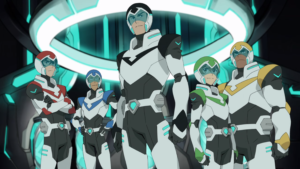Voltron: Legendary Defender’s Premiere is Top Quality Animation with a Generic Story
By: Dylan Hysen
 All of Dreamworks’ new Voltron: Legendary Defender dumped on Netflix today with an hour-long premiere, consisting of the first three episodes of the show. What’s immediately apparent in watching this new Voltron reboot is that we are witnessing American animation of the highest possible quality, the highest we’ve gotten since The Legend of Korra ended. Indeed the crew behind this new Voltron is almost exclusively made up of talent from Korra at a high creative level, with animation from the incredible Studio Mir in South Korea. It makes for an incredible viewing experience, if you can tolerate the generic 80s sci-fi story that comes along with it.
All of Dreamworks’ new Voltron: Legendary Defender dumped on Netflix today with an hour-long premiere, consisting of the first three episodes of the show. What’s immediately apparent in watching this new Voltron reboot is that we are witnessing American animation of the highest possible quality, the highest we’ve gotten since The Legend of Korra ended. Indeed the crew behind this new Voltron is almost exclusively made up of talent from Korra at a high creative level, with animation from the incredible Studio Mir in South Korea. It makes for an incredible viewing experience, if you can tolerate the generic 80s sci-fi story that comes along with it.
The writing for this premiere (by three Korra and Avatar writers) isn’t bad, it just stands out as generic and anachronistic in the current age of incredible and progressive storytelling in high quality animation. Nothing we get from this premiere story-wise is on the same stratosphere as the writing from a Korra or Steven Universe. The characterizations are base-level, the story is generic, and the humor is mostly quite bad. But it’s good enough for what this premiere serves as, an introduction and exposition to this new universe. This is a jumping off point. We need to have our characters, the world, and the mythology behind Voltron clearly established before getting into what I hope is more ambitious storytelling. What I love about how the premiere is structured story-wise is how fast-paced it is, letting the great visuals and action guide my experience, rather than the fairly weak mythology behind Voltron. They get that stuff all out of the way in these episodes, at the time when the audience is going to be the most tolerant of uninteresting mythology.
Watch this new Voltron for the highest quality animation you’ll see anywhere on television, and for the fun, somewhat brainless experience of watching an epic 80s space opera. Hopefully we’ll stay for the great crew behind this series turning it into something far greater.
5 Comments

This probably isn’t the place to bring up this argument but… I mean, I don’t have an issue comparing Korra and SU to Voltron, but I think there’s more relevant shows to compare. I don’t think Voltron is trying to be progressive (if anything, it’s less progressive in the fact that there’s no girl on the team, but also more progressive in that they aren’t all white washed males at least–there’s one token brownish lovable oaf trope, at least–either way, I don’t think that’s the goal because–>) Voltron wants to sell plastic toys and look cool selling toys, and cater to the power fantasies of the specific demographics of generic looking boys that have generic looking parents that are most likely to buy them said cool toys. So it’s going to look cool. And likely be generic in every other regard, because “generic” tends to be the biggest general group of people with expendable funds.
There’s no surprises here. *shrug*
I guess I was looking for more of a productive commentary on why shows that are well budgeted as this don’t take more of an effort to take narrative risks/challenges like your Avatars, SU’s, Grav. Falls, R n’M, MLP’s, etc. There’s an argument to be had that by investing a bit more in story you can captivate a broader audience while still selling plastic toys, and if you have staff that have a proven track record, maybe they should be given a bit more credence in the exec. meetings. Doing so could lead to capturing the eyes of fan sites like this which would offer additional free promotion and coverage, etc. In short, I would like to see less of “this show isn’t like SU and Korra” to more of “why it’s beneficially for companies to try to be like SU and Korra.” That’s the sort of editorial I would like to see–or at least the point to add in the one above. Hope that makes sense.
I disagree that this show isn’t trying to be like Korra or SU, I think it is but they’re taking it slow for some reason. Now, I haven’t watched the rest of the season yet (I’m about to and will be podcasting in each episode with Delaney), but I think it’s definitely insulting to this show to say that it’s just to sell toys and is aiming for generic storytelling. I think that’s where they’re starting, although this premiere has a ton of value beyond selling toys, even if the story itself is weak, and the rest of the season will hopefully go somewhere better story-wise while waiting the rest of the show. I’m also not interested in accepting any show as a lesser being.. if this show stays like this story-wise then I’ll call it out as having subpar writing. I except this show to be at Korra or SU-levels, I don’t care about expectations. I also guarantee you that with this crew they are trying to get there.
Cool! I look forward to the upcoming optimism. I can also Devil’s Advocate myself by saying one of the the best animated movies of all time, A Lego Movie, was a perfect example of merchandising while simultaneously delivering a plot with a *purposely generic* main character. I can make a counter point that there’s nothing wrong or insulting about making a show to sell merchandise–but good writing can really elevate that work to an all new level–which has been demonstrated to be both beneficial for animation as a medium along with business. In short, Lego movie is a good example of a show that wanted to sell toys but had good writing to back it up. It read in your synopsis that Voltron was a bad example of this because it *is* a vehicle to sell Voltron toys–*but* was only backed by “generic and anachronistic” writing themes unworthy of shows like Korra or SU. There for giving a underwhelming impression, at least initially.
Not to poke, but I’ve always wondered, you’ve routinely lauded SU’s writing, but also made a point that you strongly prefer episodes that offer tidbits about the mysterious lore or explicitly showcase other gems beyond the core CG (such as Fusion eps, Lapis arcs, Peridemptions, Hit the Diamond, etc.) over the “filler” episodes (like Steven Floats, which is in a similar vein of most the episodes in the first season that lean on splice of life). The filler/set up/atmospheric episodes make up over three-quarters of the episodes we have. So it would look to a regular joe like me that you don’t like most of the written episodes of SU by an extension, which makes it weird why you use it as a standard to grade the writing in other shows. Is it that you hold SU to such a high esteem that even the episodes that you don’t favor are still generally better than other episodes of other animated shows on TV? Is that the same case for Korra, which you admit is an inferior written product to Avatar: The Last Airbender (and if you didn’t explicitly admit this, sorry, that’s just the impression I got–also, how could you *not* admit this?)?
It seems to an outsider that you’re using a show of which the majority of episodes you don’t enjoy very much and another show that you admit has a lot of frustrating issues, got cancelled, and was generally inferior to the show prequel that came before it as a bar of quality to measure other shows. I really don’t know. Just an issue I always wondered. It’s not the first time you compared X to Korra and SU, I just always wondered why. Genuinely interested!
Speaking of SU. While I personally love both types of episodes, I admittingly look forward to the lore episodes more. They fulfill my curiosity more and give me meta-level information about the world in SU. But it’s the filler episodes that let me exercise that new knowledge and let me catch easter eggs I didn’t see before, which is just as fulfilling in its own way. I think both types of SU episodes are two faces of the same coin in this sense, the “filler episodes” raise the stakes because the enrich the world that ultimately gets threatened when the “cool episodes” come. That unique dynamic is what makes the show great to me. It’s just good pacing. I understand preferring one over the other, but not sure how ‘Hit the Diamond’ (which–while having many cute moments I loved–still has unfortunate overplayed card of Steven *talking* his way out of a major problem none of the CG’s can fix) is “one of the greatest episodes of TV” and Steven Floats (which, albeit a slower pace, is both a homecoming both narratively and *actually* since we get to see Steven back home and interacting with a core cast of beloved and fully-fleshed characters again–which we hadn’t seen since Sadie’s Song which feels like forever ago and nearly feels cathartic in a way just to have again.)
So, overall Korra’s writing is worse than Avatar but that’s too simplistic: Korra Books 3 and 4 are the same if not slightly better writing than Avatar. Overall they’re on similar levels.
I think it’s a misconception that I like the SU plot episodes better than the quiet ones. I’d say I like SU episodes that have substance over ones that feel meaningless to me. I actually don’t love the fusion episodes, because a lot of them just feel like cool visuals and fights ones to me, whereas something like the sadie pop star episode I feel like has great character work so I love that one. I love SU overall and think it’s the best show on TV, so yeah I very much like most of the episodes. Steven Floats is a rare case. Hit the Diamond I think is the best episode of the year so far, not one the best ever, and I think it’s incredible while Steven floats isn’t is because it feels so substantial to me, character wise, humor, plot, everything, whereas I don’t think Steven Floats is even a good character episode. We’ll see though, I need to rewatch it.
Great! Thanks for answering. 🙂